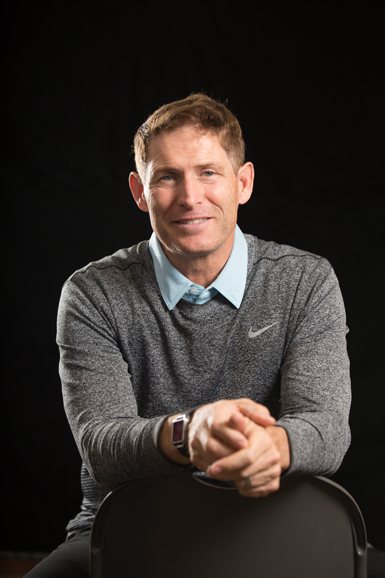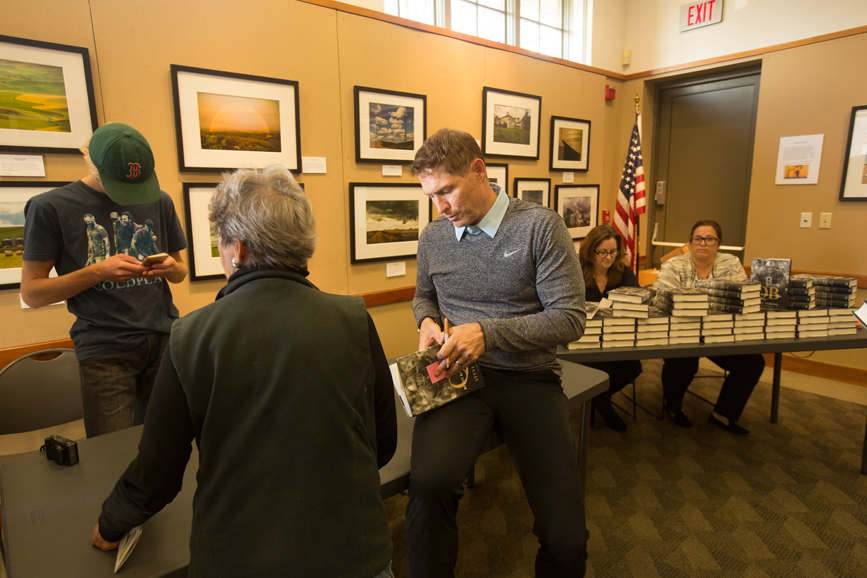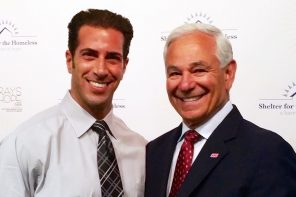Steve Young’s new book “QB: My Life Behind the Spiral” (Houghton Mifflin Harcourt, 389 pages, $30) is dedicated not only to wife Barb, “my soul-mate, my best friend, my everything,” but also to sons Braedon and Jackson and daughters Summer and Laila, “the most precious gifts in my life.”
But if Young’s children are gifts to him, the book is his gift to them — a memory of the gridiron glory he enjoyed as quarterback of the San Francisco 49ers in the 1980s and ’90s, before the children were born.
“One of my sons would come home from school and say, ‘I heard a story that you punched Joe Montana,’” Young says of the man he succeeded as the Niners’ signal caller. “And I said, ‘That’s not true.’ And then I realized my kids are not going to know what’s true or not true, so I hired (writer-producer) Jeff (Benedict) to put my recollections together for family and friends. I never thought the book would be published.”
A book about an NFL quarterback who was twice league MVP and a Super Bowl MVP: What publisher wouldn’t be interested in that story?
Young isn’t being disingenuous or falsely modest, however. Rather, that remark is typical of his self-deprecation — a self-deprecation that his wife sometimes calls him out on and that would lead him to stash paychecks worth millions in a drawer, because he didn’t think he was worthy enough to cash them.
“The anxiety informs that a little bit,” he says.
The anxiety: Throughout his career, Young has appeared to be a kind of golden boy. A lawyer; a co-founder and managing director of the private equity firm HGGC; an ESPN analyst; and co-chair, with his wife, of the board of the Forever Young Foundation, Young is intelligent, attractive, articulate, humorous and gracious. But there is a shadow side to each of us that gives form to our character and burnishes its luster. For much of his life, Young has been haunted by an anxiety that manifested itself when he was away from home or before he stepped onto the playing field. It would find him sleeping outside his parents’ bedroom as a child or sobbing, shaking, vomiting as an adult, wondering what was wrong with him. It is this anxiety and his Promethean response to it that is at the heart of “QB,” a visceral account of his life thus far that puts the reader on the playing field. (It helps that Young’s memories of key games are beautifully written in the present tense.)
Fans think of Young as a product of the West — a native of Salt Lake City, a great-great-great grandson of Mormon leader Brigham Young, who would give his name to the university from which Steve Young would later graduate and earn his law degree; a resident of the San Francisco Bay area, where he still roots for the Niners. But much of his character and gridiron dream were shaped by his years in Greenwich, to which his family moved when he was in third grade. In Greenwich public schools, he would be a straight-A student, a star in basketball, baseball and football. (In 2013, he was inducted into the Greenwich High School Sports Hall of Fame.)
But all the while, he was masking an anxiety that he could neither understand nor control. Reading “QB,” you can’t help but wonder what roles family, faith and football played in it. Young’s father, Le-Grande “Grit” Young, was a football star at BYU who would go on to become a successful labor counsel lawyer, one who taught Steve, the oldest of four, to pay his own way and never quit. He didn’t comprehend what his son was feeling.
His father’s toughness was balanced by his mother Sherry’s protectiveness. (She provides some of the amusing moments in the book —tramping across the field of a Pee Wee game in her high heels, making divots along the way, to ball out a boy who had tackled her son too forcefully for her taste; and confronting heckling fans during Young’s early pro career, reminding them that her son was a “good boy.”)
His parents, however, never pressured him into that career. Rather they were his “North Star,” keeping him on course, he says.
“Even today, I think I take my parents for granted. It was only when I had kids that I realized how good they were.”
His faith, too, has been another North Star, despite its strictures, opening him up to the suffering of others in a way that put his anxiety in perspective. One of the most moving moments in the book comes when he makes a pilgrimage to Jerusalem, walking in the footsteps of Jesus all the way to Calvary.
“The NFL seemed so far away,” he writes.
But not for long. The pilgrimage came after the Niners traded the legendary Montana — Young’s longtime rival — to the Kansas City Chiefs, leaving Young in sole possession of the quarterbacking job. If ever there were a profession the anxiety-ridden should run from, it would appear to be football. But it was a measure of Young’s talent, confidence, discipline and desire as a running quarterback that he not only survived but thrived in it.
“I never wanted my sense of fear to lead the day,” he says. “I didn’t want to stop playing. I was having so much fun.”
On Sept. 27, 1999, a particularly brutal hit in a nationally televised game against the Arizona Cardinals resulted in a concussion — one of several he sustained in his career — and forced his hand. He never played again. But by then he was engaged to Barb and a rich second chapter was about to unfold, bringing with it a new balance and maturity and an understanding that finally alleviated his anxiety.
“I think once I realized that it had a genetic component, that helped, too.”
Today, Young and his wife try to help children understand themselves through the Forever Young Foundation, which won the Charity Navigator Award for best youth and family charity. Their work has embraced the LGBT community as well.
“We want our LGBT brothers and sisters to know the door is always open.”
Open, too, for the one person he once thought of as the least worthy — himself.
For more, visit foreveryoung.org.






